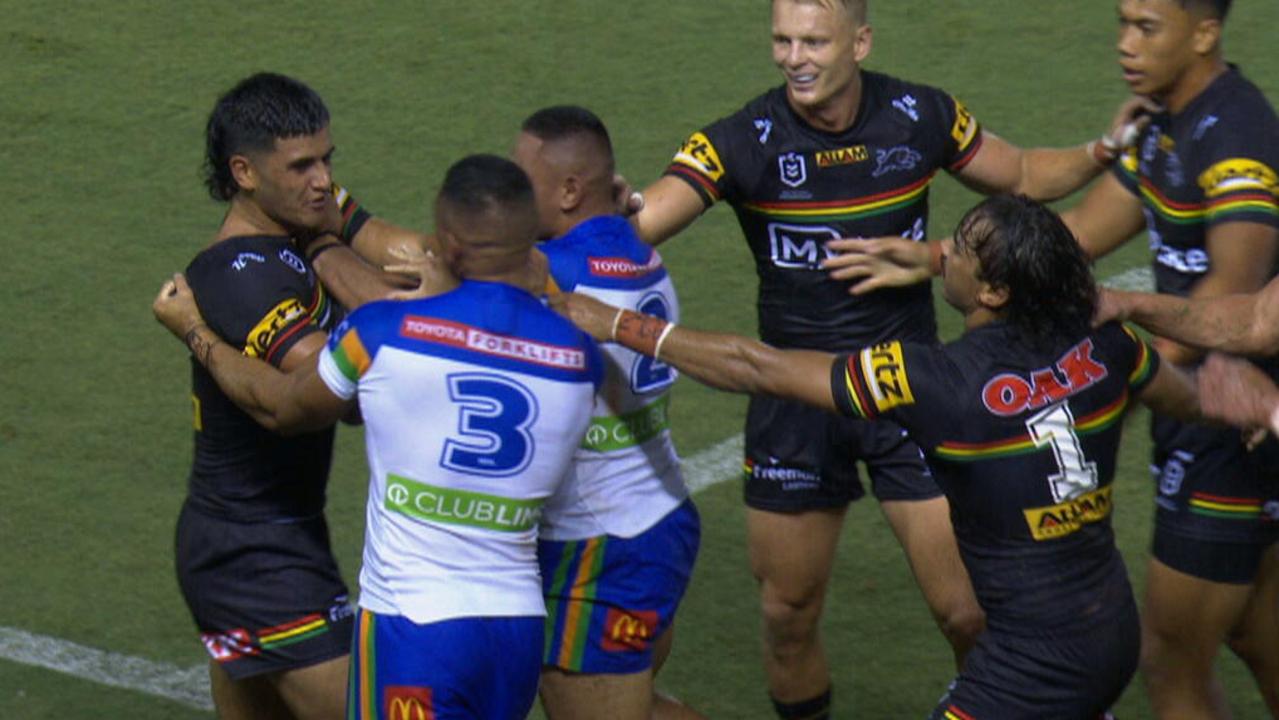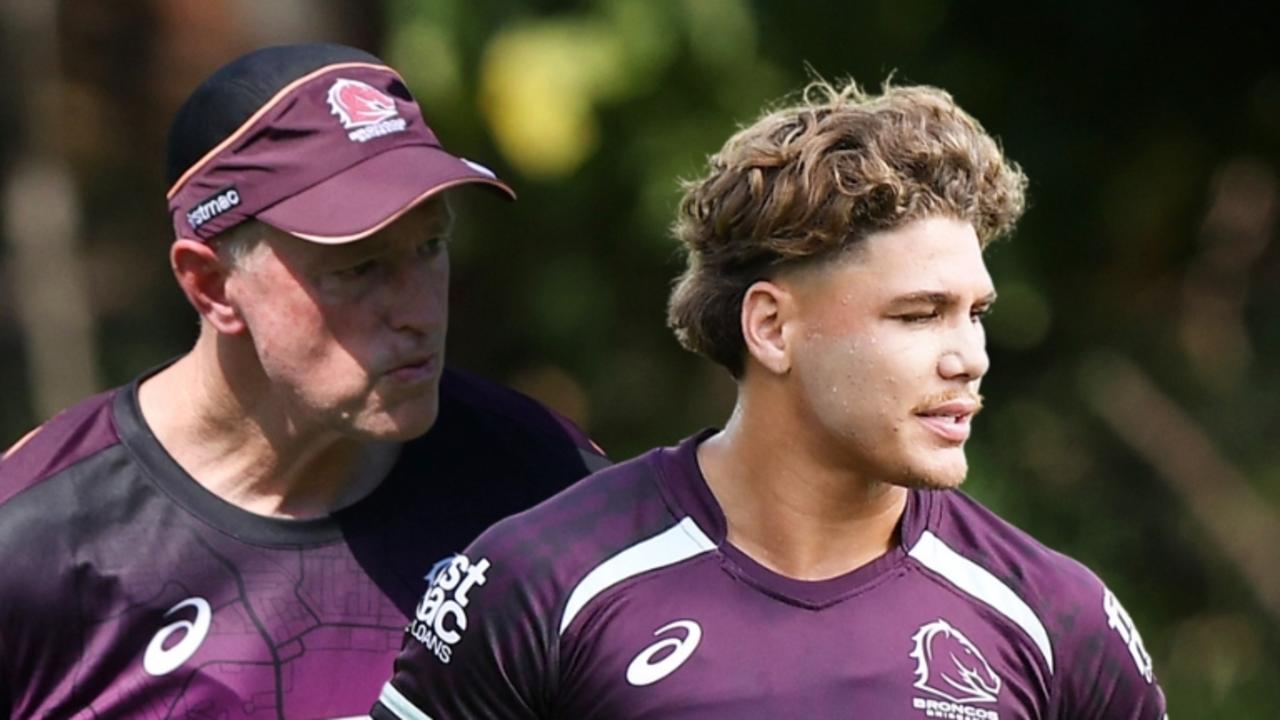NRL comes clean on controversial moments from first week of finals series
The NRL’s head of football has addressed a number of controversial incidents from the first week of this year’s finals series.
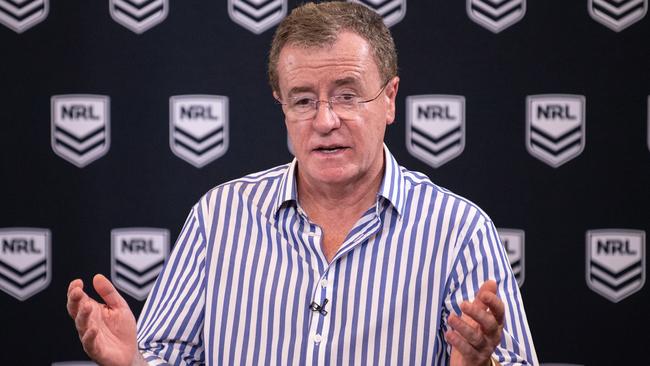
Teams
Don't miss out on the headlines from Teams. Followed categories will be added to My News.
The NRL has defended a handful of controversial refereeing decisions made during the first weekend of the finals series.
In week one of the play-offs, the Storm, Roosters, Rabbitohs and Eels all emerged victorious, but divisive moments were peppered throughout the four games.
Watch every 2021 NRL Telstra Finals Series match before Grand Final. Live & Ad-Break Free on Kayo. New to Kayo? Try 14-days free >
At his weekly press briefing on Monday, NRL head of football Graham Annesley said he had full confidence that the league’s match officials made the right calls in the first four games of the finals.
Annesley also rebuffed suggestion that the war of words between Panthers coach Ivan Cleary and his Rabbitohs counterpart Wayne Bennett had influenced the refereeing of the sides’ qualifying final.
Following Penrith’s loss, Cleary said the NRL needed “to make a decision on whether they’re going to allow coaches to deliberately manipulate referees and try to influence them”.
Cleary’s comments came after both he and Bennett made allegations about the refereeing of the sides' previous encounter ahead of Saturday’s final.
“It’s part of the theatre of the game of rugby league,” Annesley said.
“Coaches are entitled to have their views about the game.”
Annesley said neither coach’s comments had swayed the referees.
“The point that this particular debate has been about has been attempts to influence the thoughts or views of match officials. My view is that a lot of this is background noise,” he said.
“This has been happening for as long as I’ve been involved in the game. Coaches make public statements, for whatever motivation.
“Referees … tend to make decisions based on what players do, not what other people say. They’re adjudicators. They have to wait for things to happen and they have to make a decision based on what they see.
“A lot of it is noise, white noise.”
Walker’s field goal
In the first elimination final between the Titans and Roosters, Gold Coast fans were left fuming after a wall of Tricolour defenders appeared to obstruct defenders from tackling Sam Walker as he kicked the matchwinning field goal.
Annesley rebuffed suggestions the Roosters had performed an illegal manoeuvre.
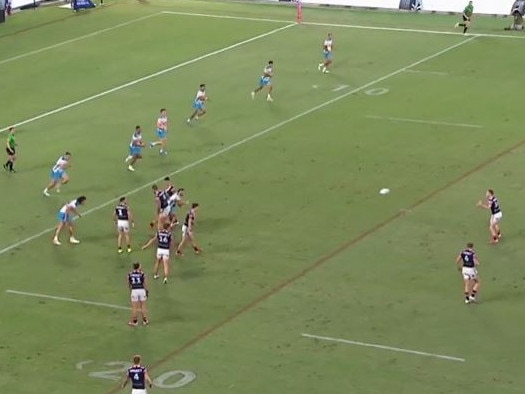
“There was a bit of discussion here about players standing beside the ruck,” Annesley said.
“This is not something that’s unusual.
“We’re not going to change the rules that we’ve been playing under all year just because we’re in the finals series.”
According to the NRL’s Laws and Interpretations: “If two or more players form a wall (side-by-side) next to the play-the-ball and don’t allow the opportunity for a defending player to move directly towards the player in possession, the referee will penalise for obstruction.”
Annesley said given Titans hooker Mitch Rein was able to make an attempt to charge the field goal down, he had not been denied an opportunity to “move directly towards the player in possession”.
“The real issue here is whether those players actually prevent an opposition player or a defender from moving towards the player in possession,” Annesley said.
“The reason that ‘side-by-side’ is in parenthesis there is if they literally stand shoulder to shoulder to make sure that a player can’t get through.
“(Rein) got through and he was able to put pressure on the kicker.”
Koloamatangi vs Cleary
Annesley stood by the referees’ decision to penalise Souths forward Keaon Koloamatangi for a shot on Nathan Cleary in the Rabbitohs’ upset win over Penrith.
Koloamatangi wrapped Cleary up immediately after the Panthers halfback had kicked the ball and was penalised for the hit.
Pundits complained that Cleary did not appear to be in the air when he was tackled, but Annesley said he needn’t have been for a penalty to have been awarded.
Annesley said the NRL had contacted each of the 16 teams “a couple of months ago” to address late hits on kickers.
In a memorandum addressed July 27, the NRL told clubs that if “the kicking player is in the act of kicking the ball and has either one or both feet off the ground and/or he is otherwise off balance”, a defender may be penalised for attempting a tackle.
Koloamatangi was not charged by the match review committee but Annesley said the penalty was “absolutely valid” given Cleary’s kicking foot was still off the ground when the Rabbitoh tackled him.
Drop ball or drop kick?
In the second elimination final, the Eels put the nail in the Novocastrians’ coffin with a penalty try in the shadow of full-time.
In the lead-up to the play, Parramatta fullback Clinton Gutherson grubbered into the in-goal. Rookie Will Penisini gave chase but was ruled to have been impeded by Knights winger Enari Tuala in doing so.
A penalty try ensued but punters were left scratching their heads given Gutherson appeared to have dropped the ball immediately prior to his kick.
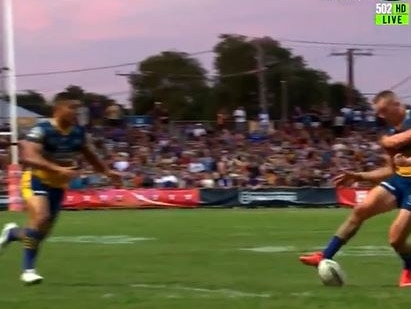
Annesley clarified that, provided his intention was to kick the ball, Gutherson was legally able to perform a drop kick, even if he was not attempting a field goal.
“He’s definitely moving his foot towards the ball, so he’s certainly attempting to kick it. I don’t think there’s any suggestion that the ball accidentally hit his foot,” Annesley said.
“Although it’s arguable about whether the ball hit the ground before the boot hit the ball, it actually makes no difference.
“People tend to only think of drop kicks as field goal attempts but any player can drop kick the ball in an any position on the field.
“As long as (Gutherson) is always attempting to kick it … under the laws of the game, it is still a drop kick and it’s not a knock-on.”
Penalty try?
Annesley also explained why the Eels were awarded a penalty try, while the Roosters were not, following a similar incident in the first elimination final.
In the win over Gold Coast, Roosters forward Victor Radley chased a kick through the line and looked likely to score before Titans utility Tyrone Peachey interfered with him.
Given Titans fullback Jayden Campbell was also very close to the play, Annesley said that, unlike in the Eels game, the bunker could not be certain that the offensive player would have scored. Therefore, a penalty try was not awarded.
“Campbell’s in a position to make a tackle,” he said.
“There is still an opportunity that Campbell could have prevented that try from being scored, by knocking the ball out, by holding him up. Maybe he still loses the ball in the course of the tackle.
“There’s no doubt that Peachey’s actions constitute a professional foul … a sin bin and a penalty I think is the right decision here, primarily because of the positioning of Campbell.”
Originally published as NRL comes clean on controversial moments from first week of finals series

